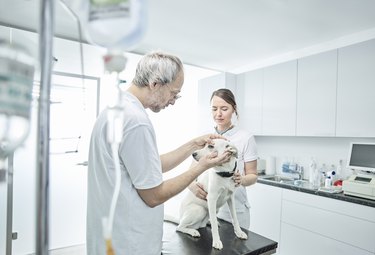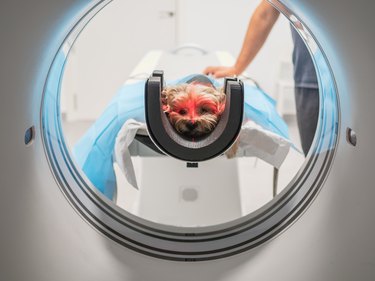We all love our dogs like family members and hope that nothing serious ever happens to them, but it is also important to be prepared for potential emergencies. Just like humans can experience head injuries, it's possible for your dog to also sustain a head injury. If your dog hit his head or was in an accident involving head trauma, which is also called traumatic brain injury, you'll need to know how to handle the situation and how to quickly get your dog the help he needs.

Video of the Day
Common causes of head trauma in dogs
The good news is that head trauma in dogs is relatively rare. Dogs have thicker skulls than humans have, which helps to protect them from head trauma. They also have generous muscling on their heads which can minimize the physical effects that a significant impact can have on a dog. Plus, it helps that dogs are lower to the ground so they don't have as far to fall. Being on four legs also helps steady them.
Video of the Day
When head trauma does occur in dogs, it can have a number of potential causes. Car accidents or falls from a high elevation are common causes of head injuries. Dogs can also sustain a head injury from fighting or playing roughly with other dogs.
Dog head injury symptoms

If you can recognize the signs of head trauma in puppies and dogs, you can quickly work to minimize the damage and get your dog the help he needs. One of the clearest signs that your dog may have sustained head trauma is for you to see the incident or impact that may have caused the trauma. If you do witness the incident, try to make note of important details, such as the height that your dog fell from or the surface that he landed on. These details can help your veterinarian to assess and treat your dog.
If you don't witness the actual incident or impact, you can still recognize head trauma in dogs based on symptoms alone. Common symptoms include:
- Bleeding from the nose or ears.
- Confusion and disorientation.
- Dilated pupils.
- Facial weakness.
- Broken teeth and bruising in the mouth.
- Cuts or abrasions on the head.
- Lethargy and stumbling, or paralysis.
- Loss of consciousness.
Head trauma in dogs can also cause seizures and even lead to death. If you see any of these symptoms in your dog, you should take them seriously and seek immediate veterinary help.
Head trauma treatments in dogs

A dog who has sustained head trauma needs immediate help, even if that means taking her to the closest emergency veterinary hospital. Your vet will work to stabilize your dog and may provide fluids and supportive care. Ideally, a veterinary neurologist should examine your dog to assess the extent of her injuries.
Your vet or the veterinary neurologist may perform a cat scan or MRI to assess the fractures and damage to your dog's brain. Some dogs can recover from head trauma with only supportive care, but head trauma can lead to other long-term issues, including seizures. You may need to establish a relationship with a neurologist who can help you to care for your dog long-term if and when these issues arise.
The vet may provide your dog with pain medication to help her heal, and if there's risk of infection, your vet will prescribe antibiotics. Hyperbaric oxygen therapy is also sometimes used to help dogs heal from these traumatic brain injuries. Remember that head trauma can occur in many different degrees, so the best thing that you can do for your dog is to stay calm, seek immediate veterinary care, and work with your vet to help your dog recover.